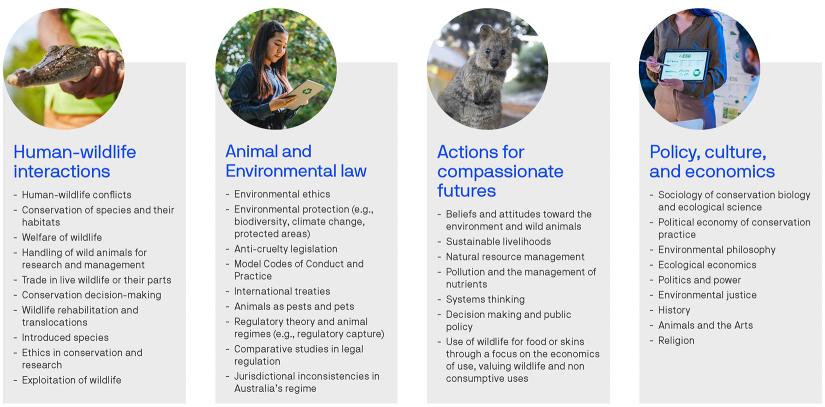The UTS Centre for Compassionate Conservation (CfCC) strives to bring together the theoretical and philosophical underpinnings of inclusion, with practical and scientific approaches for solving complex real-world problems.

Our research themes

Human-wildlife relationships
Conservation initiatives
| Animal and environmental law and policy
Natural resource management
|
Featured projects
Remaking One Health: Decolonial Approaches to Street Dogs and Rabies in India
This multidisciplinary and international project investigates the historical, everyday, institutional, psycho-social, and ecological aspects of rabies and the people-dog-health interface in India. Through the lens of a One Health paradigm that recognises the interconnected nature of humans, animals and our shared environment, the research is delivering new insights into effective, ethical, and socio-culturally appropriate ways of caring for street dogs and preventing rabies.
The CfCC team is part of a large international collaboration that includes researchers from India, the United Kingdom, and Australia. Founding universities include the University of Edinburgh, Liverpool University, the University of Western Australia, and UTS.
Through this project, the CfCC has established partnerships with the Nature Conservation Foundation India, Socratus, Ambedkar University, the Humane Society International India, Welfare of Stray Dogs, Help in Suffering, and Working for Animals.
- CfCC Chief Investigators: Associate Professor Daniel Ramp, Dr Rosalie Chapple
- CfCC postgraduate students (PhD candidates): Nynke Kooistra, Prativa Bomzon, Rashmi Singh Rana
- Funder: The Wellcome Trust
Foragecaster: Agricultural remote sensing for sustainable agricultural landscapes
In this large collaborative project, researchers are developing artificial intelligence (AI) and machine learning forecasting tools to help farmers predict and improve pasture quality, resilience, and biodiversity in the face of climate change.
Digital transformation paves the way for transformative approaches to challenging norms. In a conservation context, this includes the unnecessary exclusion of wildlife, the establishment of intensive monocultures, and unsustainable management practices. Using farmers’ own data, our goal is to show that more inclusive approaches to farm and environmental sustainability are better for people, the environment, and non-human beings who coexist in food production landscapes.
- CfCC investigators: Associate Professor Daniel Ramp, Dr Abolfazl Abdollahi
- CfCC postgraduate students (PhD candidates): Alex Trobec (National Industry PhD Scholarship)
- Funder: Food Agility CRC, AgriWebb

